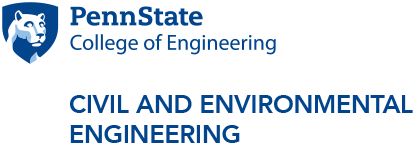Laboratory Investigations of Flow-Sediment-Microbe Interactions River Sediment and Nutrient Concentrations in Flat Landscapes: The Role of Connectivity (or Lack Thereof)
Abstract: A wide variety of global environmental and health issues involve physical and biological interactions among fluids, particles or surfaces, and microbes at both micro- and macro-scales. For example, macro- or channel-scale sediment transport, a key process that controls coastal erosion, can vary by several orders of magnitude due to micro-scale sediment-sediment and sediment-bacteria interactions, including aggregation and biofilm formation. Other examples include clay algae flocculation, one of the most promising methods to remove harmful algal blooms, and soil carbon storage, responsible for the uptake of about one fifth of annual anthropogenic carbon emissions, both of which are strongly impacted by the physical and biogeochemical interactions between clay micro-aggregates and living organisms at the micro-scale. Experimental studies of fluid-particle/surface-bacteria interactions across both micro- and macro-scales are needed to address these environmental and health issues, yet such experiments are currently lacking. In this talk, I will show how I use “soil-on-a-chip” experiments and meso-scale bacterial visualization experiments to unravel the transport of carbon and bacterial cells in soil. Further, I will discuss how my group is integrating technologies at different scales to understand the fundamentals of fluid-particle-microbe interactions, which will help with predictions and mitigations of coastal erosion, harmful algal blooms, soil carbon emission, and the spread of pathogenic bacteria.
Biography: Judy Yang is currently an assistant professor in the Department of Civil, Environmental, and Geo-Engineering and Saint Anthony Falls Laboratory at the University of Minnesota. She obtained her Ph.D. degree in Environmental Engineering at MIT in 2018. She had been a postdoctoral researcher at Princeton University from 2018 to 2020. She is interested in designing multiscale experiments, ranging from microfluidics to flume experiments, to unravel impacts of micro-scale transport processes on macro-scale environmental and health issues, including coastal erosion, soil carbon dynamics, bacterial spreading in soil, and bacterial lung infections.
Genevieve Ali, University of Guelph (Canada)
Abstract: The vast majority of conceptual models describing runoff generation and ecohydrological connectivity have been developed in small, temperate humid, forested hillslopes and catchments with moderate to significant topographic relief. While useful to put forward a priori hypotheses anywhere, these models are not easily transferable to regions that do not share the aforementioned characteristics. In particular, large, human-dominated, flat watersheds have lots of intensive agricultural activities and engineered stormwater-control infrastructure that can impede or enhance natural water and nutrient flow pathways, thereby modifying hydrobiogeochemical processes in ways that are poorly understood. As a result, river nutrient concentrations are especially difficult to predict in such watersheds, due to a lack of identification of the drivers of water and nutrient connectivity from land-to-stream. Improving our understanding of connectivity dynamics and their drivers is critical in these flat, human-dominated watersheds, given that they are often under the triple threat of floods, drought and eutrophication. Therefore, in this presentation, I will go over one case study to highlight the challenges associated with conducting detailed field investigations of water quality and connectivity in this type of watersheds. I will notably show examples of inconclusive results and discuss how field experimental setups may need to be rethought when dealing with human-dominated, flat watersheds.
Biography: Dr. Genevieve Ali is an Associate Professor at the University of Guelph (Ontario, Canada). She holds a B.Sc. and a Ph.D. in environmental Geography from the Université de Montréal. After doing a postdoc at the Northern Rivers Institute at the University of Aberdeen, she took her first faculty position at the University of Manitoba(Central Canada) in 2012, before moving to her current position at the University of Guelph in 2019. Genevieve et her group’s research interests include the study of: (i) runoff generation processes through the analysis of hydrological data (e.g., streamflow, soil moisture, water table levels); (ii) contaminant export dynamics through concentration-discharge relationships and statistical water quality models; (iii) ecohydrological connectivity through the integration of field data, remote sensing data and spatial statistics; and (iv) functional watershed classification. While she was originally trained as a forest hydrologist, Genevieve has recently developed an interest and expertise in human-dominated watersheds, where natural flow paths have been significantly altered by surface drains, tile drains, storage ponds, farm dams, wetland drainage, and various agricultural practices.
Event Contact: Li Li



